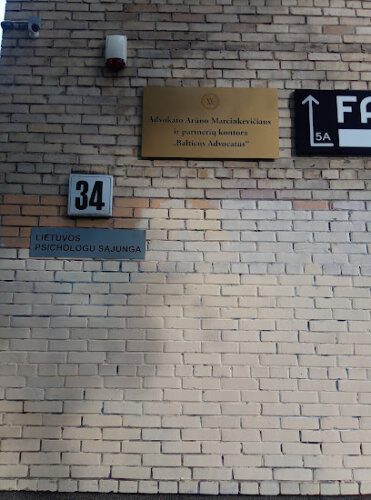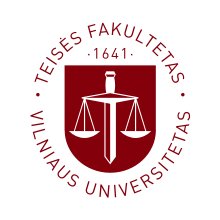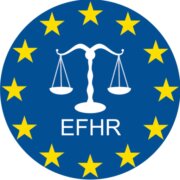Best Native People Lawyers in Vilnius
Share your needs with us, get contacted by law firms.
Free. Takes 2 min.
List of the best lawyers in Vilnius, Republic of Lithuania


About Native People Law in Vilnius, Republic of Lithuania
In Vilnius, the capital of the Republic of Lithuania, Native People refers to the indigenous communities and ethnic minorities that reside within the country. The legal framework concerning Native People encompasses various aspects such as cultural rights, land claims, and recognition of heritage. Despite the rich cultural history, the Native population often faces challenges in obtaining specific legal protections and recognition. Efforts are continually being made to acknowledge their rights and integrate them into the fabric of Lithuanian law and society, especially in a city as diverse as Vilnius.
Why You May Need a Lawyer
Several situations might require the assistance of a lawyer experienced in Native People law in Vilnius:
- Cultural Preservation: Legal advice may be needed for issues on the preservation of cultural traditions and intellectual property rights.
- Land Rights: Navigating property laws and establishing claims to traditional lands can be complex.
- Discrimination: If you've experienced discrimination based on ethnicity, a lawyer can help assert your rights.
- Recognition: Legal assistance may be necessary to gain formal recognition of native status.
- Government Relations: When engaging with government on policy or benefits, a lawyer can provide guidance.
Local Laws Overview
Key aspects of local laws relevant to Native People in Vilnius include:
- Constitutional Rights: The Constitution of Lithuania upholds equality and offers protection against discrimination.
- Cultural Rights: Laws exist to protect cultural heritage, allowing preservation and recognizing its value in a broader context.
- Ethnic Minority Rights: There are specific legislative measures to safeguard the rights of ethnic minorities.
- Education and Language: Provisions exist for the use and teaching of languages of national minorities in areas where there's a significant demographic presence.
- Social Policy: Native communities have specific avenues for social support, though these can vary in effectiveness and application.
Frequently Asked Questions
Who are considered Native People in Lithuania?
Native People in Lithuania often refer to indigenous groups and ethnic minorities, including but not limited to historic communities with distinct cultural and linguistic identities.
Is there an official registry for Native People in Lithuania?
Currently, Lithuania does not maintain an official registry for Native People, but recognition is typically based on historical and cultural factors.
How are Native People represented in the government?
Representation is primarily through cultural organizations and advocacy groups, as there are no specific governmental quotas or seats reserved for Native People.
Can Native People in Lithuania practice their cultural traditions freely?
Yes, generally they can, as the Lithuanian legal framework supports cultural expression and preservation of heritage.
Are there any specific laws that protect the lands of Native People?
While there are laws concerning property and heritage sites, specific legislative acts aiming to protect traditional lands are limited.
What resources are available for Native People experiencing discrimination?
Individuals can reach out to non-profit organizations specializing in ethnic minority rights, or governmental bodies like the Equal Opportunities Ombudsperson.
Do Native People have the right to education in their native languages?
Yes, in regions with significant Native populations, schools may offer instruction in minority languages alongside Lithuanian.
What role do cultural centers play for Native People in Vilnius?
Cultural centers offer a space for preserving and promoting cultural identity and serve as resources for community engagement and support.
How are cultural heritage sites protected under Lithuanian law?
Such sites are protected under preservation legislation which aims to maintain and promote historical and cultural assets.
What is the relationship between international organizations and Native People in Lithuania?
International organizations often work in partnership with local groups to advocate for rights and provide platforms for cultural exchange.
Additional Resources
For those seeking further assistance or information, consider reaching out to:
- The Department of National Minorities under the Government of the Republic of Lithuania
- The Equal Opportunities Ombudsperson Office
- Local NGOs like the Lithuanian Centre for Human Rights
- Vilnius Cultural Centers dedicated to ethnic minorities
Next Steps
If you require legal assistance in matters involving Native People in Vilnius, begin by consulting with a lawyer specializing in ethnic minority rights or cultural heritage law. Research potential legal advocates through local bar associations or by contacting one of the recommended organizations for referrals. It's vital to ensure your legal counsel is well-versed in both Lithuanian law and the specific nuances relevant to Native People.
Lawzana helps you find the best lawyers and law firms in Vilnius through a curated and pre-screened list of qualified legal professionals. Our platform offers rankings and detailed profiles of attorneys and law firms, allowing you to compare based on practice areas, including Native People, experience, and client feedback.
Each profile includes a description of the firm's areas of practice, client reviews, team members and partners, year of establishment, spoken languages, office locations, contact information, social media presence, and any published articles or resources. Most firms on our platform speak English and are experienced in both local and international legal matters.
Get a quote from top-rated law firms in Vilnius, Republic of Lithuania — quickly, securely, and without unnecessary hassle.
Disclaimer:
The information provided on this page is for general informational purposes only and does not constitute legal advice. While we strive to ensure the accuracy and relevance of the content, legal information may change over time, and interpretations of the law can vary. You should always consult with a qualified legal professional for advice specific to your situation.
We disclaim all liability for actions taken or not taken based on the content of this page. If you believe any information is incorrect or outdated, please contact us, and we will review and update it where appropriate.













